What does it take to build and maintain a functional civilization? There are likely many answers and many perspectives, but in this case I’m talking about physical requirements. People who live and work somewhere need to be able to get around safely, and they also need infrastructure to be in place for the essentials of being alive. What is required and who makes the decisions?
Every week, I produce this newsletter to let as many people as I can about the various meetings that are held where decisions are made on what to plan and what to build in the public realm. Our mutual systems are incredibly complex and I have spent much of my career trying to get better at making people understand the details. I chose the path of journalism nearly 30 years ago and feel very fortunate to continue to be able to spend time researching what’s happening at what I think are key points in my community’s history and future.
This week is a pivotal one in many ways.
- Albemarle County’s Planning Commission will be presented with details on a forecast of how much residential and commercial square footage can be built within the designated growth area.
- The Rivanna Water and Sewer Authority’s Board of Directors will be presented with a look at what’s needed to ensure drinking water can flow decades from now.
- The Regional Transit Partnership will be presented with an updated vision for what public transportation could look like if there was additional funding.
- Charlottesville’s City Council and Planning Commission will offer feedback on an eventual plan to de-highway Fifth Street as well as how what the city needs to be able to manage future transportation projects.
Each of these items will touch upon the entire population who live here now as well as those who have yet to be born or have yet to move here. My hope is to get more people comfortable with the details and to provide context, but seldom an opinion on what should happen. I really only want you to read it and send the work on to other people who may also want to know more about this civilization that has been built for us to maintain.
As always, thanks to the Piedmont Environmental Council for their ongoing support of this newsletter and the time it takes to put it together each week.
Monday, May 23, 2022
Albemarle holding demonstration of electric vehicles
With the support of Virginia Clean Cities, the city of Charlottesville, and the University of Virginia, Albemarle County will transform the parking lot of the McIntire Building into a showcase for electric vehicles for all manner of publicly-owned vehicles. Part of the event will be held for fleet managers and vehicle operators from 3 p.m. to 5 p.m.
“Hear from a UVA fleet manager about staff experience operating these EVs,” reads the announcement on the county’s website. “Public Works and Parks & Rec staff especially encouraged to attend.”
At 5 p.m., the public is invited to come take a look for themselves. (meeting info)
In other meetings:
- Fluvanna’s Social Services Board meets at 3 p.m. at the Department of Social Services in the first floor conference room in Fork Union. There’s no agenda for the meeting online. (meeting info)
- Albemarle’s Historic Preservation Committee will meet virtually at 4:30 p.m. The group will resume the conversation about the Comprehensive Plan, following up from April’s discussion on the same topic. The demolition report includes six items. (meeting info)
- The Pantops Community Advisory Committee will meet virtually at 6:15 p.m. and will receive the same briefing on Albemarle’s Climate Action Plan as the other CAC groups. Here’s a story from the one given to Crozet.(meeting info)
- The Charlottesville Redevelopment and Housing Authority’s Board of Directors is regularly scheduled to meet monthly on the fourth Monday at 6 p.m. but there is no meeting this week.
Tuesday, May 24, 2022
Albemarle PC to get data on build-out analysis of county’s growth area
Planning staff in Albemarle County have been working on the Comprehensive Plan for the past six months since being directed to do so by the Board of Supervisors. There are four phases planned and the first takes a look at the county’s growth management policy.
“The current policy directs new residential and commercial growth to the designated Development Areas, which currently cover about five percent of the County’s land area,” reads the staff report for a 4 p.m. Albemarle Planning Commission work session on the first results of that work. The meeting will be held in-person with hybrid options. (meeting info)
Albemarle County hired the firm Kimley-Horn and Associates to review the land in the development areas to see whether there’s enough room for future buildings to accommodate population growth. One of the population projection estimates is put out by the Weldon Cooper Center for Public Service who estimate an increase from 112,395 in 2020 to 138,483 in 2040.
“There appears to be sufficient land available for residential and non-residential growth in the existing Development Areas,” reads slide 38 of the presentation. “However, that is predicated on assumptions including; development at the higher end of recommended ranges, significant redevelopment and infill, updates to zoning to match future land use, incentives for affordable housing, and economic development.”
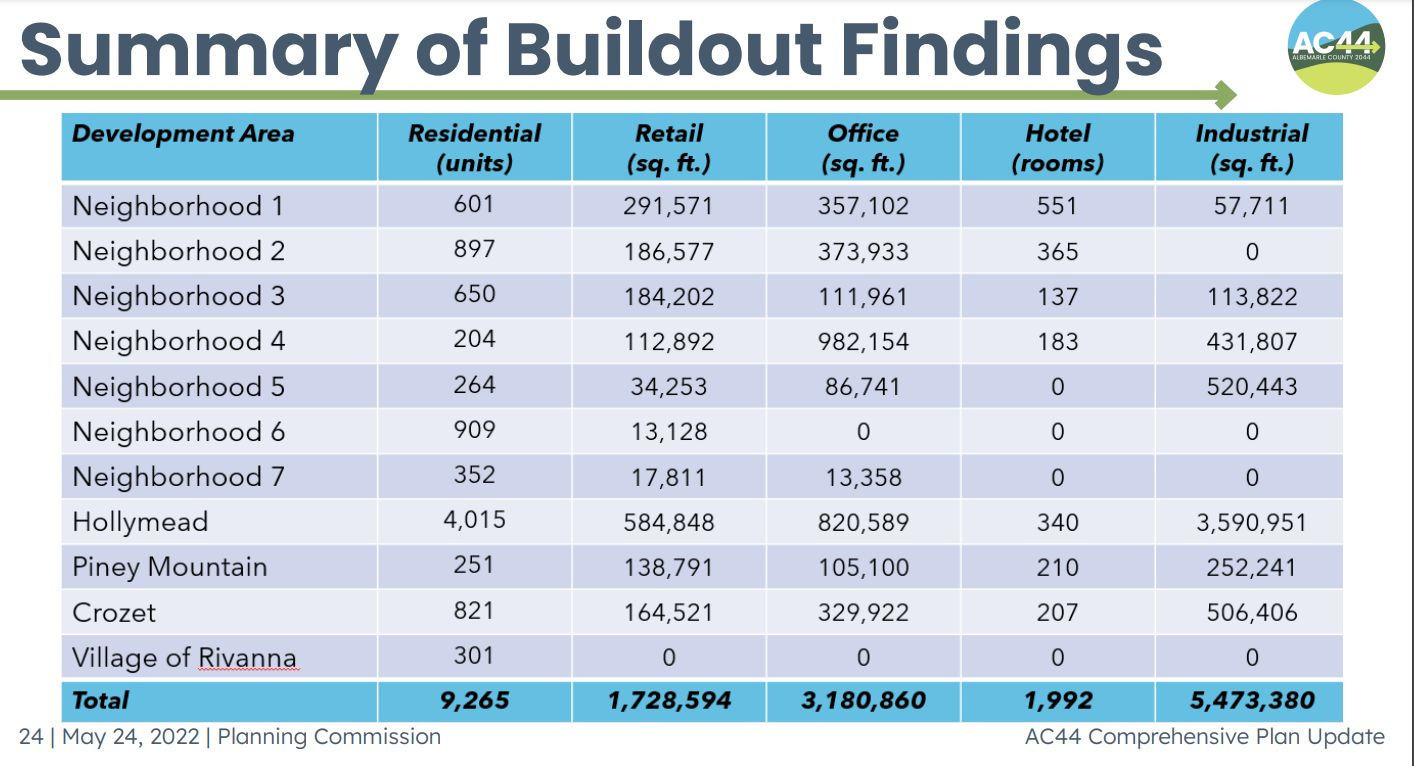
The regular meeting begins at 6 p.m. After a public comment period, the first action item on the agenda is adoption of new rules of procedure for PC meetings. This appears to include new rules on how members can participate electronically. (draft rules)
Next, the Planning Commission will hold a public hearing on a new private school for up to 60 students to be built just outside the development area on Barracks Road. However, the project is eligible for public water service and this property is right next to the future Field School, which can have up to 150 students. Staff recommends approval with some conditions. (staff report)
Finally, it will be the Planning Commission’s turn to review the Rio Road Corridor Plan, which offers suggestions for how future conditions should be built along what is technically called Route 631.
“The concepts within this document are not final designed projects approved and ready for construction, but rather reflect the vision for what kind of improvements are needed to address the issues found along the corridor and would be considered the most desired or acceptable form of improvement for the corridor,” reads the cover letter for the project. “It should be noted that only one project discussed in the plan is currently funded by VDOT, the John W. Warner Parkway/Rio Road roundabout improvement.”
The plan’s scope goes from the intersection of Rio Road and U.S. 29 to the city limits.
“The areas of the county that directly surround the urban core are, themselves, becoming increasingly urban as the region continues to experience rapid growth and development,” reads the introduction to the study itself. “This growth necessitates that the public infrastructure respond accordingly.”
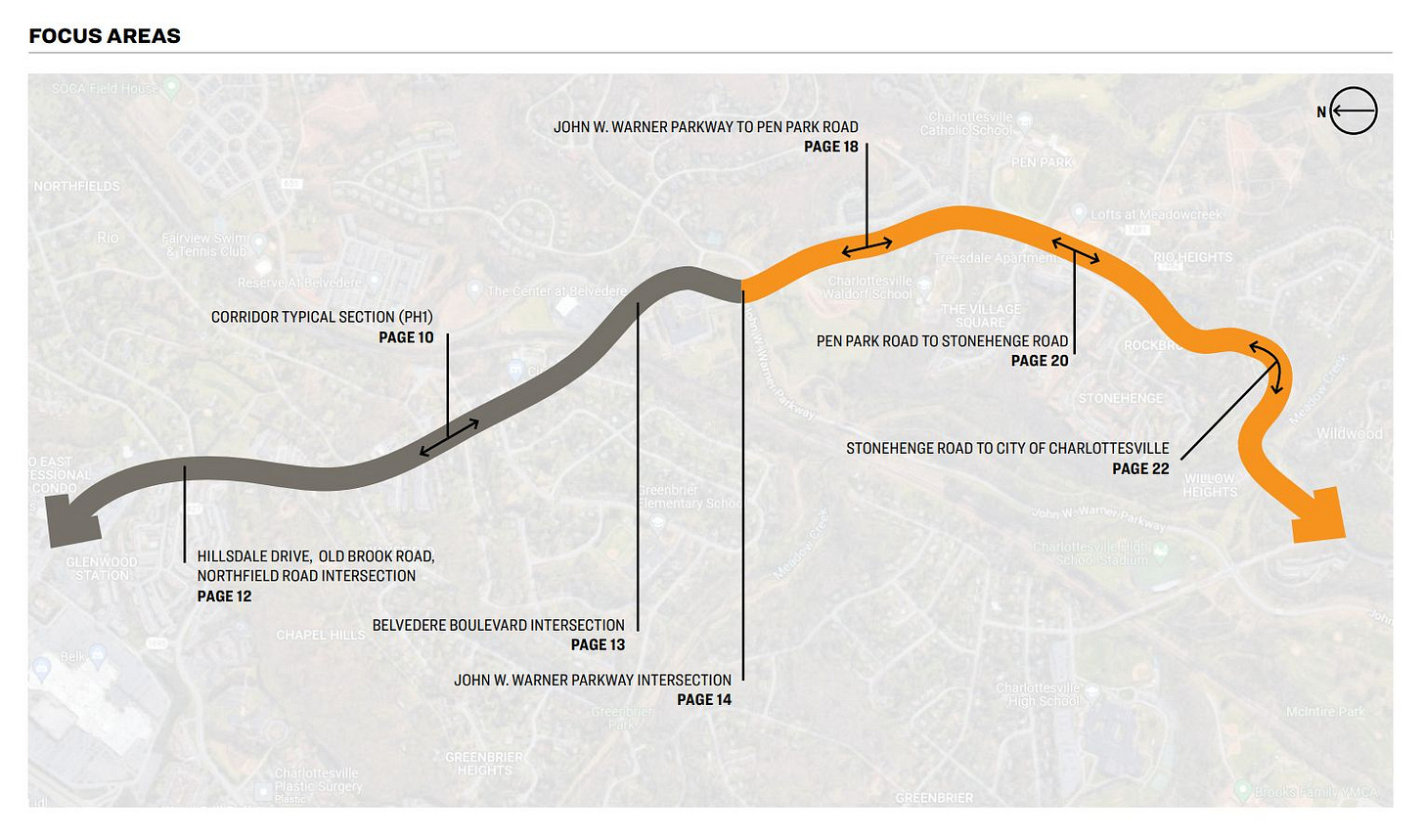
Charlottesville Council to meet with Charlottesville PC on Fifth Street safety improvements
Charlottesville City Council and the Charlottesville Planning Commission regularly have a joint meeting at which land use public hearings are held. Tonight’s virtual work session deals with transportation with one specific project followed by a discussion of whether the city is capable of managing projects through the process from planning to construction.
The meeting begins at 5 p.m. and is a virtual event. (meeting info) (agenda)
First, though, Council will hold the second reading on a grant of $1.5 million in city funds for “housing assistance” to low and moderate income homeowners. More on that in the next Charlottesville Community Engagement.
The first item for the joint meeting deals with potential ways to improve safety on 5th Street, a four-lane highway from Ridge Street to I-64. A recent string of deaths has fueled public pressure for the city to take action, action that will take the form of a Smart Scale application for funding from the Virginia Department of Transportation that is due on August 1.
The city is not starting from scratch. A study on the 5th Street / Ridge / McIntire Corridor was completed in 2018. VDOT awarded two Smart Scale projects in the area, with one to build a turn lane at Cherry Avenue and another to build multimodal improvements on Ridge Street.
A study of crashes in the past ten years reveals that three-quarters are related to intersections, and all four of the fatalities since 2017 were incidents where the parties were going between ten and 45 miles-per-hour faster than the speed limit.
The firm EPR has been hired to come up with alternatives, with two former city employees listed as the consultants. Several options have been developed for the next Smart Scale application for Council and the Planning Commission to provide feedback on:
- Alternative 1 – Enhanced Bike / Ped + RCUT: Protected bicycle lanes would be built on both sides of the road, and left-hand turn movements would be replaced with U-turns.
- Alternative 2 – Road Diet (Bus Priority Lane & Separated Bike Lane): Bus priority lanes would be built in both directions, and bike lanes would be separated. One sidewalks would be expanded to six feet wide while the other would be converted to a ten-foot-wide shared use path.
- A roundabout would be built at Bailey Road to slow traffic
- Low cost measures including photo-red enforcement, mid-block crossings, guard rails, and better lighting.
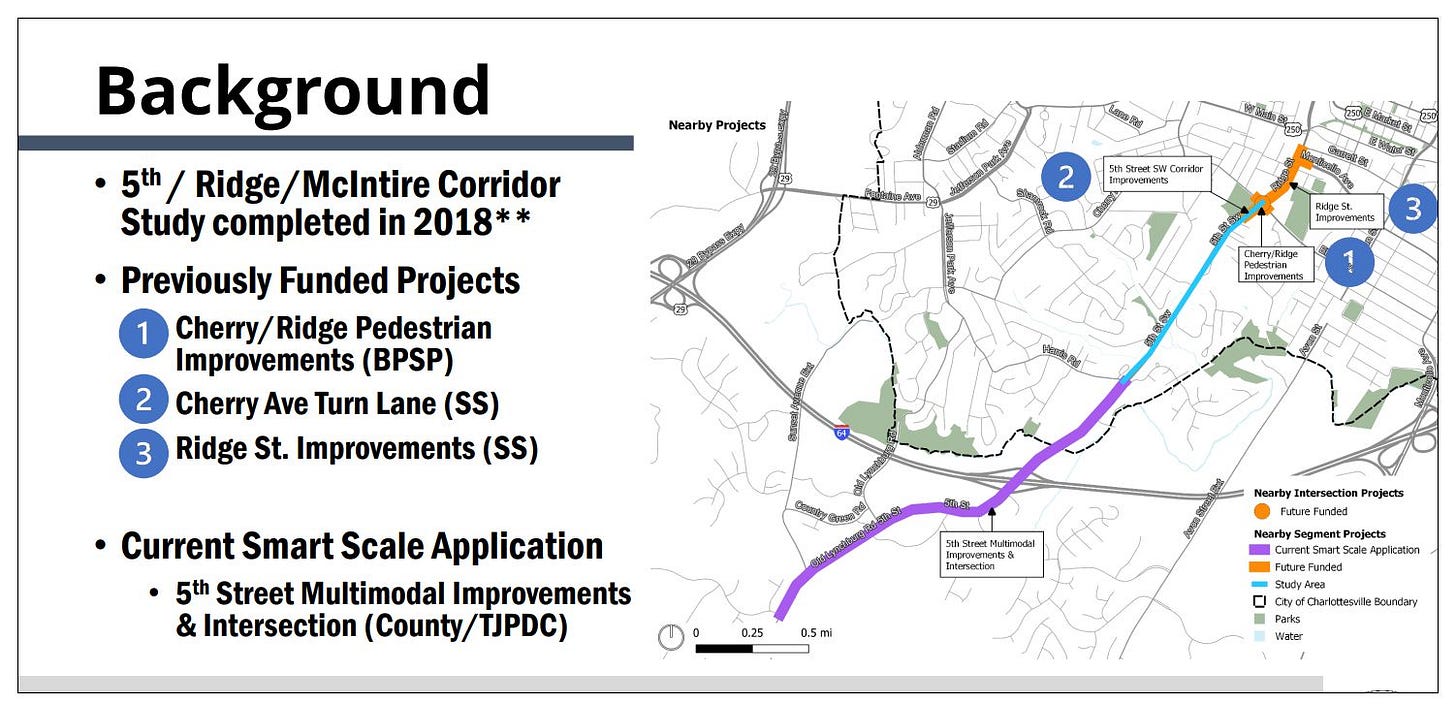
In the next work session, engineers in the Public Works Division will provide an overview of $185 million worth of projects that are funded but not yet completed or built. These include nine Smart Scale projects ($95.9 million), revenue-sharing projects ($66.8 million), bridge projects ($19.1 million), and highway safety improvement programs ($2.6 million).
City Council has already eliminated some of these projects, such as the first two phases of the West Main Streetscape. Other projects are over budget and funding needs to be identified for them to continue. For instance, over $1.8 million is needed for the Fontaine Avenue Streetscape to go forward. That project was approved in the first Smart Scale funding round in June 2016. Another project approved at that time was the Emmet Street Streetscape, and that one is $6.3 million under budget.
Staff is recommending officially defunding or holding on all four phases of the West Main Streetscape as well as another Smart Scale project at Preston/Grady. They’re also recommending combining the Ridge and Cherry Avenue Smart Scale projects with the forthcoming 5th Street application.
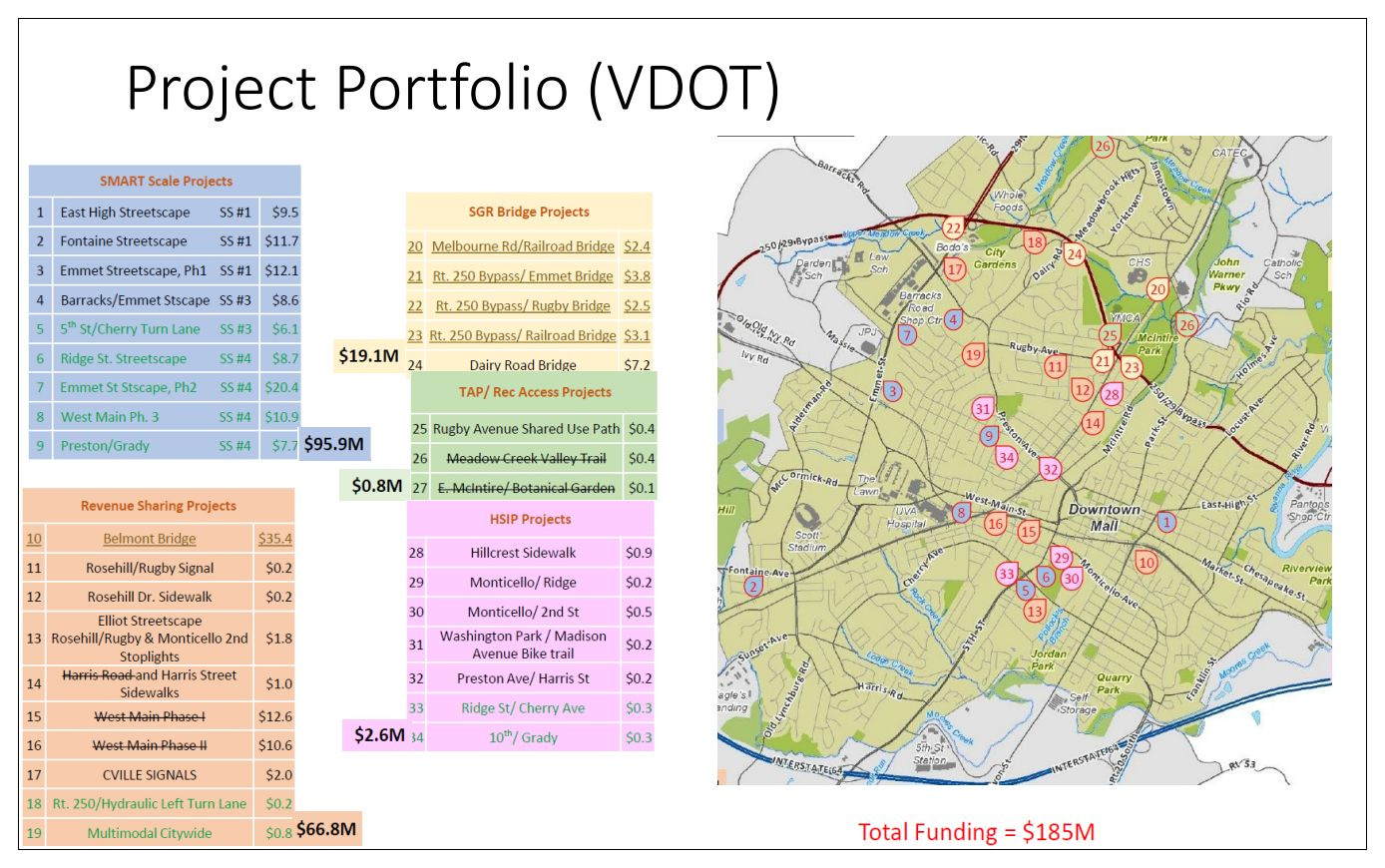
Greene County Supervisors to consider water and sewer ordinance
Greene County is a community in transition with one eye toward increasing density. Now that the locality has departed from the Rapidan Service Authority, work can move forward on building a reservoir that’s previously been approved by the U.S. Army Corps of Engineers. They’ll meet in open session at 6:30 p.m. for a regular business meeting with lots of small items that all add up. (agenda)
There are three public hearings which reflect a local government seeking to find new ways to recover the cost of doing business. The first would be to authorize the county to collect a fee when a person is convicted of a driving under the influence. The second would allow Greene to assess a $25 fee for anyone processed into jail. The third would unlock the ability of the county to fine individuals $100 for allowing dogs to run off leash.
In the next action item, they’ll consider various increases to solid waste tipping fees. For instance, the fee to dispose of construction materials will increase from $56 a ton to $60 a ton.
Next, there’s an approval of a memorandum of understanding with Jaunt perhaps related to its continued operation of Greene County Transit. There’s no information about this item in the packet, but last week I wrote a summary of new CEO’s first conversation with Charlottesville City Council. (read that story)
Other action items include an approval of new bylaws for the Greene County Tourism Council, and two requests to use funding from the American Rescue Plan Act. One is for a new ambulance and the other is to help cover the costs of stormwater improvements related to the Stanardsville Streetscape Project.
There will also be a presentation on a proposed water and sewer ordinance. There’s no advance information, but the details will be worth paying attention to as Greene County moves towards its future, one meeting at a time. For more details on recent items before the Department of Community Development, click this report.
Rivanna Solid Waste Authority to review its history
What is the Rivanna Solid Waste Authority, and how did it come to be formed in 1990? That’s one of the items on the agenda for today’s meeting of the Board of Directors which takes place via Zoom at 2 p.m. (meeting info)
“There are a number of agreements staff must manage to properly allocate charges to the [Charlottesville], [Albemarle County], and [the University of Virginia],” reads one of the slides in a presentation.
Most of the Board is either new to the area or new to elected office and Executive Director Bill Mawyer will review those agreements ranging from the Solid Waste Organizational Agreement signed in 1990 up to a proposed agreement to build a facility to bale paper products for recycling.
The RSWA Board will also adopt the rate schedule for FY23 as well the proposed $6.8 million for the entity’s operations. They’ll also approve a contractor to complete the Southern Albemarle Convenience Center.
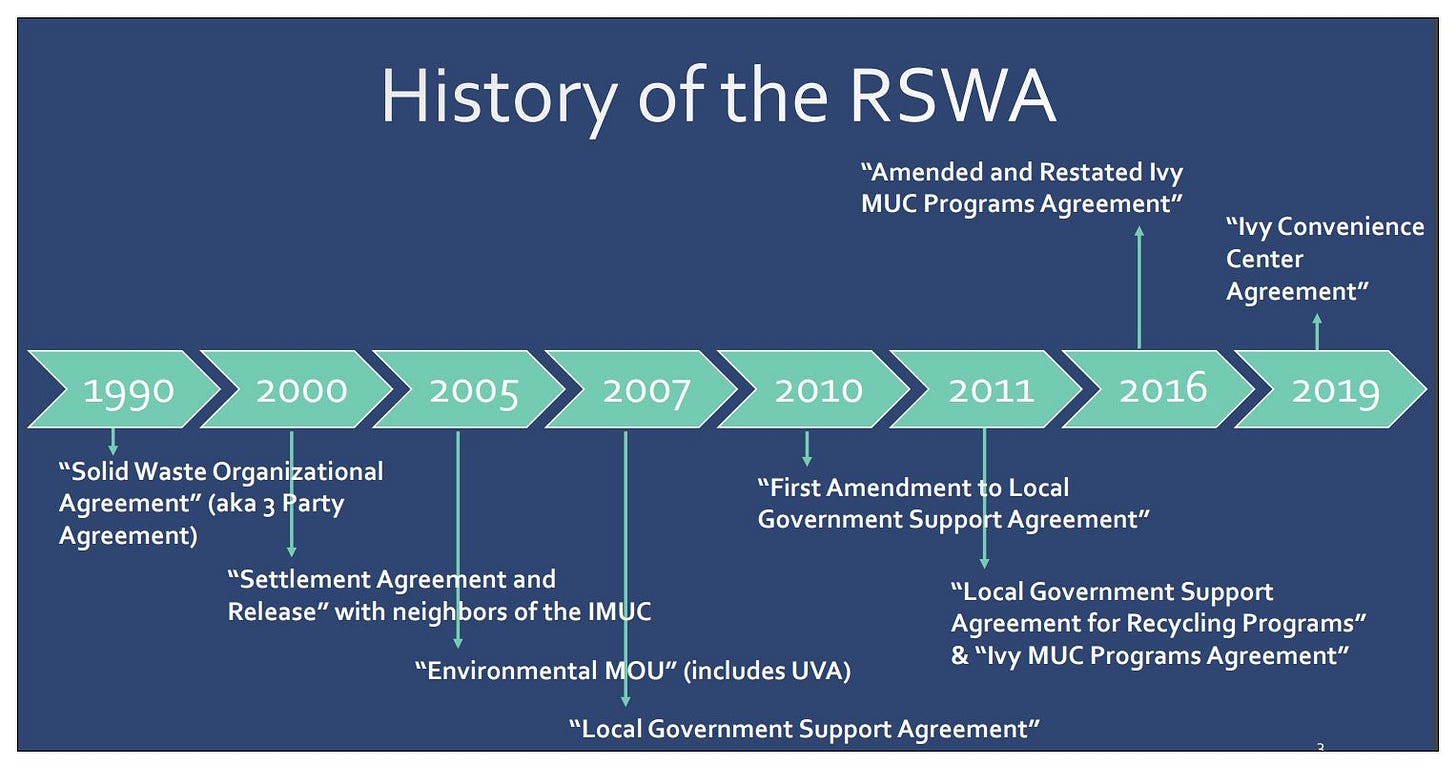
Rivanna Water and Sewer Authority to adopt capital improvement program
The Rivanna Water and Sewer Authority meets immediately after the RSWA. The first major item is the adoption of a $205.1 million five-year capital improvement plan (CIP).
“We continue to strategically plan for the water supply, drinking water, and wastewater treatment facilities required to meet the requirements of Federal and State regulations, as well as the quantity, quality, and reliability expectations of the public drinking water and wastewater customers in our community,” reads the introduction to the item. (page 172 of the packet)
Cost estimates for construction of several capital projects have increased as detailed on page 176 of the packet. The CIP does not include a future waterline that is required to complete the community water supply plan by connecting the South Fork Rivanna Reservoir and the Ragged Mountain Reservoir. That has an estimated cost of $80 million. Work will get underway in the near future on building a portion of the waterline on University of Virginia Foundation property at Birdwood.
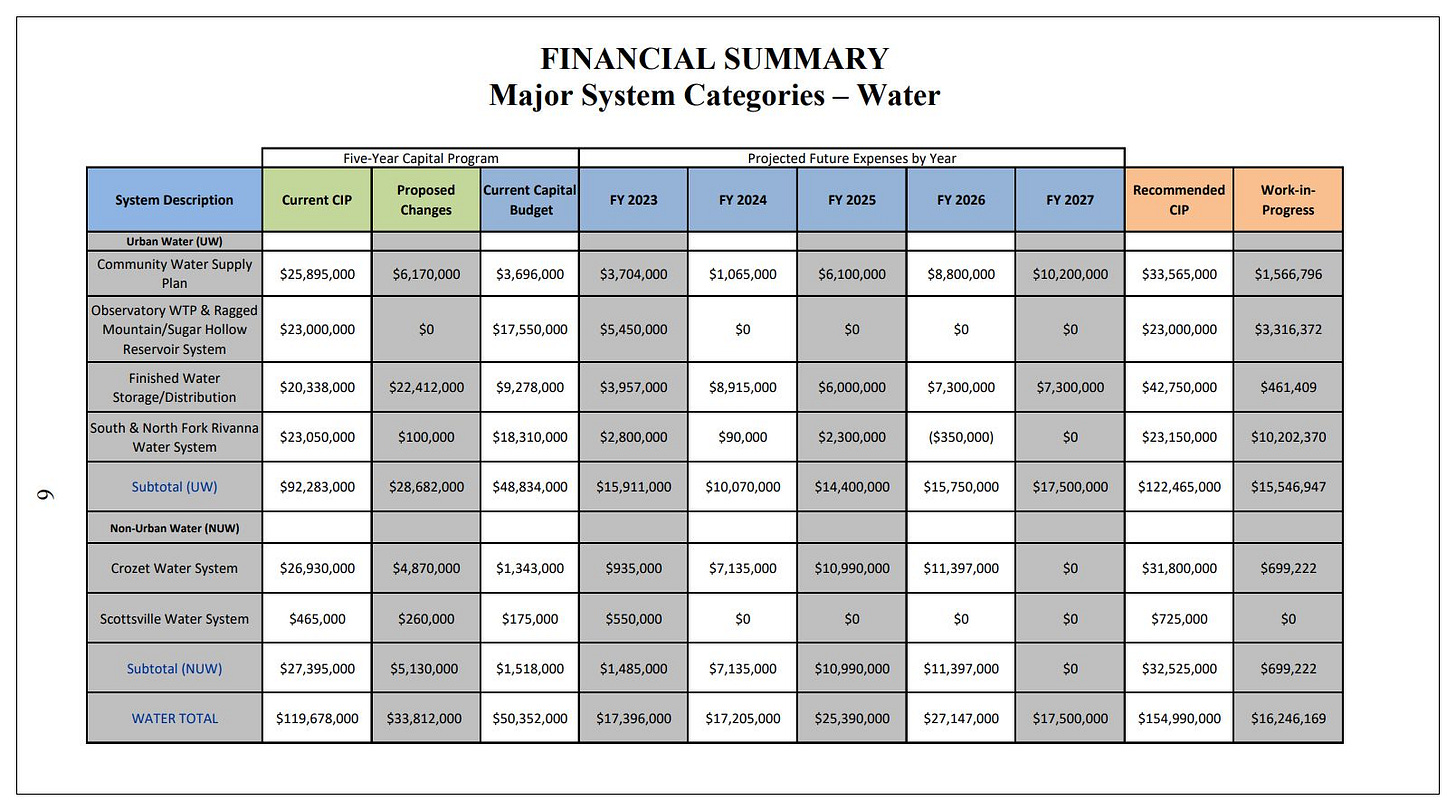
The RWSA Board will also consider adopting a $41.9 million operating budget for FY23, with around half of that designated for debt service on capital costs. The budget is 2.9 percent higher than the current fiscal year. The budget includes rate increases for both the City of Charlottesville and the Albemarle County Service Authority, who consist of the only two customers of the RWSA. The city’s increase is 6.9 percent and the ACSA’s increase is 9.6 percent.
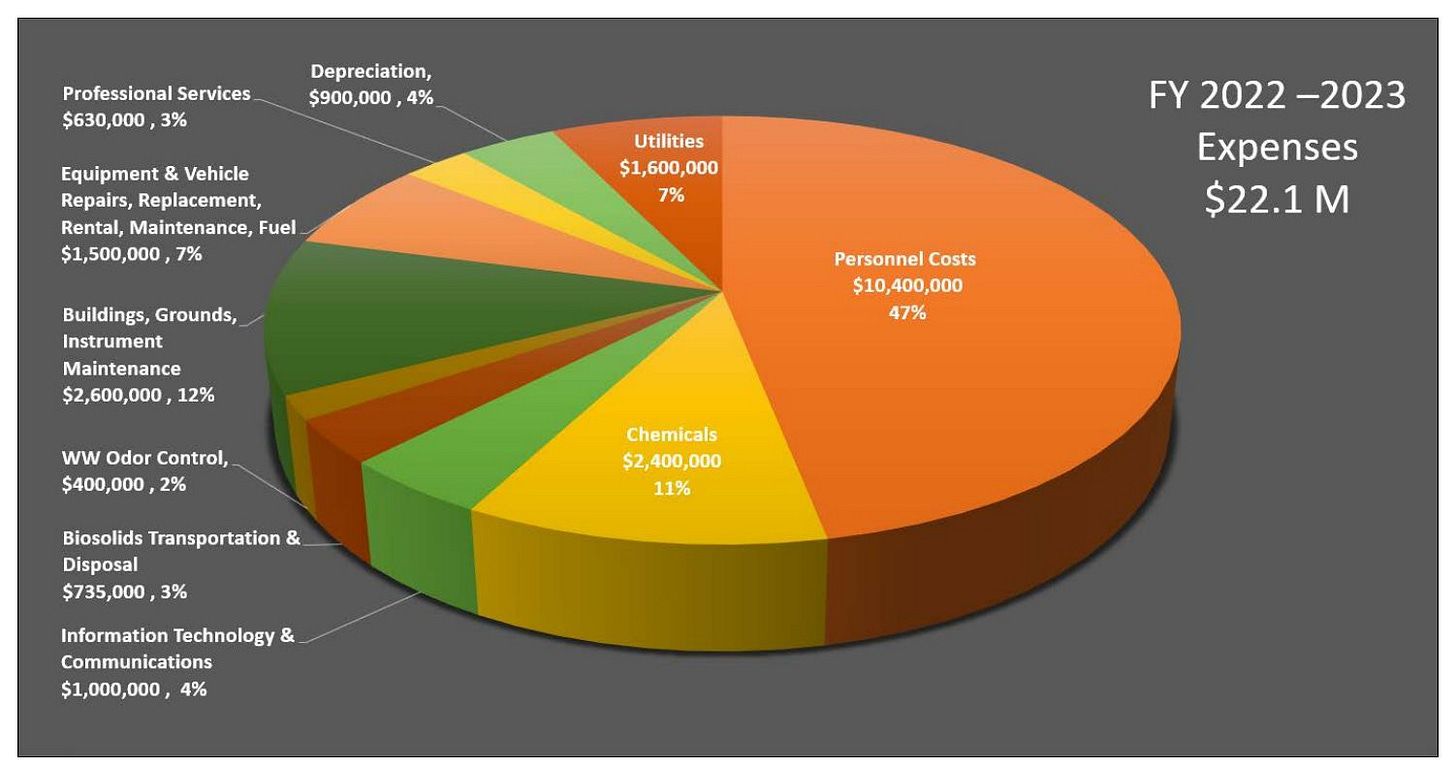
But wait! There’s more! The RWSA Board will also be presented with a plan to augment the capacity of the city’s urban water system in the form of future capital projects. Some of these are not anticipated for another several decades, but others are more pressing.
The latter include the construction of a new Central Water Line to connect the Observatory Water Treatment Plant with the Pantops area. Another future project would be a water line from the South Fork Rivanna Water Treatment Plant to the Hollymead / North Fork area. This would allow for a water treatment plan on the North Fork of the Rivanna River to be retired.
I’ll comment here that anyone interested in the above discussion about capacity in the growth area might want to become very aware of the details of this planning. A larger population requires the capacity to provide drinking water and to process that water when people are done with it. This comes at a cost as you can see in detail.
Wednesday. May 25, 2022
Design public hearing for U.S. 29 / Hydraulic intersection projects
Potentially one of the more transformative Smart Scale projects is located at the intersection of U.S. 29 and Hydraulic Road in both Albemarle County and Charlottesville. There are multiple phases intended to make several improvements to movements in the area, though the main intersection will remain signalized. The projects are:
- A pedestrian bridge over U.S. 29 with bus stops and shelters near Zan Road
- A signalized pedestrian crossing and reconfigured traffic movements at the Hydraulic Road and U.S. 29 intersection
- Reconstruct the Angus Road and U.S. 29 intersection as a continuous green-T (CGT) intersection
- Reconstruct the Hillsdale and Hydraulic Road intersection as a roundabout
- Improve access management at the Hydraulic Road/Brandywine Drive and Hydraulic Road/Michie Drive intersections
There will be a “design public hearing” beginning at 5 p.m. at the Hillsdale Drive Conference Center which means your comments taken either virtually or at the meeting will be taken into consideration as the project continues to go through design. It will be some years before these projects go to construction, but they are considered to be fully funded. (meeting info)
Some of the funding for this project is leftover from the Route 29 Solutions project which itself was funded after the Commonwealth Transportation Board abandoned a plan to build a western bypass of U.S. 29. All of that funding was transferred into several projects, including the grade-separated intersection at U.S. 29 and Rio Road and the extension of Berkmar Drive to Hollymead Town Center.
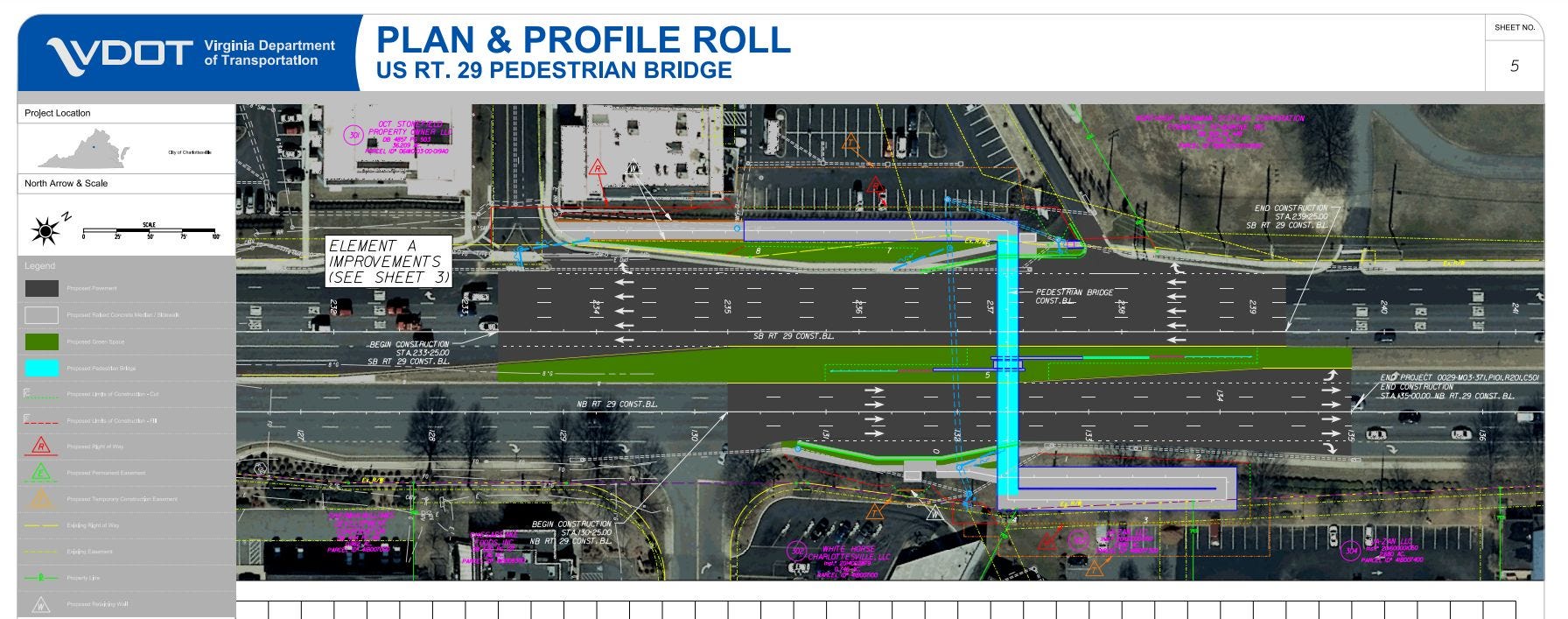
In other meetings:
- Albemarle’s Board of Supervisors meet in a closed session at 8 a.m. There’s currently no agenda for meeting, but the six-member body has had multiple sessions recently to select a new county attorney (meeting info)
- Charlottesville’s Retirement Commission meets virtually at 8:30 a.m. (meeting info)
- The Albemarle Broadband Authority meets virtually at 5 p.m. In addition to getting updates on projects funded through the Virginia Telecommunications Initiative, there will be a strategy discussion on what to do in the 2023 round of funding. There will also be a discussion on the eventual return to in-person meetings. (meeting info)
- The Albemarle Fire EMS Board meets virtually at 1800 hours (6 p.m. for civilians) and there will be a conversation about how to improve response times and procedures for single family homes. (meeting info)
- The Nelson County Planning Commission meets at 7 p.m. in the General District Courtroom. On the agenda is an application from the new owners of the Mark Addy Inn for outdoor music. (agenda packet)
Thursday, May 26, 2022
Consultants to present regional transit vision to transit partnership
Consultants hired by the Thomas Jefferson Planning District Commission to craft a vision for how public transportation might work better in the Charlottesville area will present more details next Thursday at the Jefferson Area Regional Transit Partnership. (meeting info) (agenda packet)
The firm AECOM is the lead consultant with Jarrett Walker and Associates serving as a subcontractor. The study may recommend the eventual transition to a unified regional transit authority.
“There will be a 90 minute presentation from the consultants to go over what we’ve done so far, survey the results of the first round of public engagement, and then also what they found for the vision for the community,” said Lucinda Shannon, a transportation planner for the TJPDC.
Shannon told a technical committee of the Metropolitan Planning Organization last week that a three-day workshop was held with the transit providers to imagine new bus routes under a new scenario where there is $26 million in annual funding from a new transportation authority. The consultants modeled that scenario after a new authority in the Richmond area that was created in 2020.
“We looked at the Central Virginia [Transportation] Authority’s model of how they collect revenue to kind of calculate how much we could collect if we formed an authority to pay for the vision,” Shannon said.
Shannon said that for now, the JWA’s work is more about what the vision will be. A second round of public engagement will take place soon after next week’s partnership meeting.
“It is important to note that the two network concepts presented in this report are draft concepts,” reads the draft plan. “That means that there are more conversations to be had with both stakeholders in the Charlottesville area and the public on what we should prioritize going forward.”
Shannon said the firm AECOM may also be hired to conduct a governance study to recommend how to actually come up with that hypothetical $26 million. That work is contingent on approval by the Commonwealth Transportation Board at their meeting in June. Shannon said this study will be more about the funding than changing the structure of area transit.
“So it’s not going to be looking at how [Charlottesville Area Transit] or any of the service providers are governed or run or anything like that,” Shannon said. “It’s just bringing in money and putting it out for transit.”
Funding for these studies come from Albemarle County, Charlottesville, and the Department of Rail and Public Transportation. The budget for the vision plan is $350,000 and the budget for the governance plan is $150,000.
(The above text first appeared in the May 20, 2022 edition of Charlottesville Community Engagement)
In other meetings:
- The Places29-Rio Community Advisory Committee meets at 6 p.m. virtually. The agenda is not available, but this year the CACs mostly are all utilizing the same programming. This month is the climate action planning process in Albemarle. (meeting info)
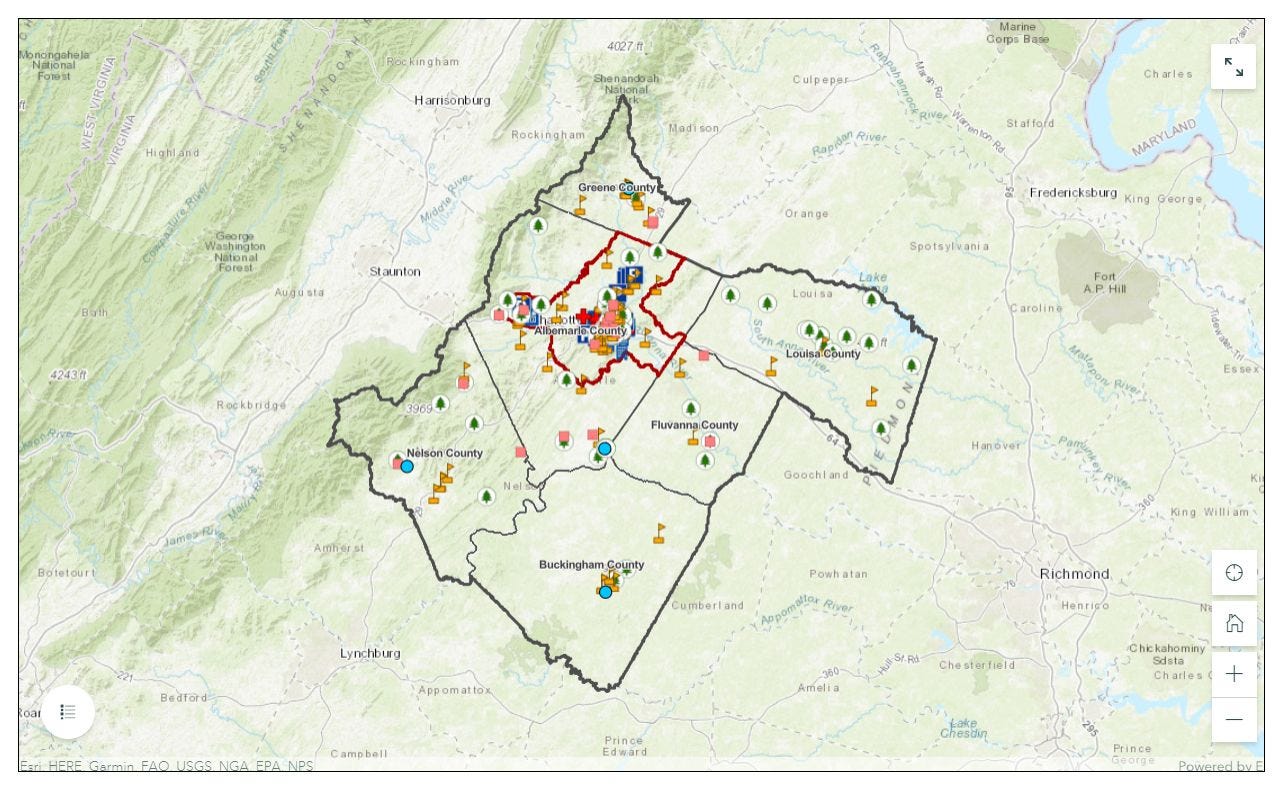
Friday, May 27, 2022
I do not see anything on the agenda. It’s always possible I’ve missed something. Please let me know, and so not hesitate to tell me if you see a typo or anything else that doesn’t look right. I’m the sole person who works on this at the moment, as I don’t have the resources to hire an editor. I am hopeful that will happen in the near future.
This post was contributed by Sean Tubbs. Sean is a journalist working to build a new information and news outlet centered around Charlottesville and Virginia. In 2020, he launched a daily newscast and newsletter and also created a semi-regular podcast on the pandemic.
Support for Sean’s “Week Ahead” update comes from The Piedmont Environmental Council.
